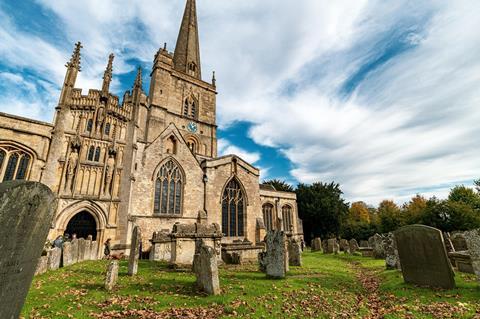Have church planters stopped using the word ‘church’ to describe their gatherings? That’s the claim in much of the mainstream media this week, as some accuse the Church of England of undertaking a “woke rebrand”. Emma Fowle takes a closer look at the story

A couple of years ago, our church changed it name.
‘Wadebridge Christian Centre’, became ‘Connect Church’.
Explaining the reasons behind the rebrand, the leadership observed how curious locals would often refer to us as, “the Christian centre”, and do so with slight confusion. What exactly was a ‘Christian centre’? It sounded slightly new-agey, or perhaps a place for old people.
‘Christian centre’ was confusing. But everyone understands what a church is…don’t they?
Perhaps not. A new report from the Centre for Church Planting Theology and Research at Cranmer Hall, Durham has looked at more than 900 “new things” started across eleven Church of England dioceses over the past decade. One of the major findings – and concerns – was about “a new ecclesial language” emerging. In the past we might have called them “church plants”, “fresh expressions of church” or “new churches” but of the eleven dioceses surveyed, not one chose the word “church” as the main descriptor of its work. Instead, terms such as “worshipping community”, “new Christian community” or “gathering” are being used.
Woke rebrand
Immediately, the mainstream press swung into action.
GB News said Lambeth Palace was undertaking a “woke rebrand” and The Telegraph went with the headline: “Church of England dropping word ‘church’ to be more ‘modern’”.
Writing for Unherd, Rev Giles Fraser claimed that the CofE was “ditching the word church”, adding that: “Not since Prince became Squiggle has there been such a daft revision.”
Whether or not it’s an internal edict, it’s clear that many people are uncomfortable with the church label
Not so fast. A CofE spokesperson told Premier this week that all of the above is merely a “silly season” story and confirmed nobody was actually “dropping the word church”.
“A lot of new congregations use terms like ‘new worshipping community’ as they meet in existing churches or in centres outside a church but they are still churches”, they explained.
So is this all a storm in teacup? Perhaps media organisations are so low on stories this summer, they’re concocting a controversy that doesn’t really exist?
A grassroots movement
The CofE’s response makes it clear that dropping the word ‘church’ is not part of any central strategy.
But Will Foulger who authored the New Things report, has pondered: “That the term ‘church’ is not used is worthy of theological reflection.” He’s right. After all, this pattern is apparently emerging across eleven of the CofE’s 42 dioceses, and across 900 projects – all with no central coordination.
Not many non-Christians would have the first clue what a ‘new Christian community’ is
No one is telling people to ditch the word ‘church’. Yet in 900 different places, alternative terms to ‘church’ are being preferred. Why?
Perhaps, like other terms such as ‘evangelical’, the word ‘church’ has become simply too loaded with assumptions, stereotypes and baggage. For some, it conjures memories of personal hurts, systematic injustices or widespread abuse. Leadership scandals and the moral failures of those in charge have tarnished its reputation, and ongoing debates over issues such as sexuality and same-sex marriage have often put it in the spotlight for all the wrong reasons.
New Things highlighted a clear desire to create ”a change in culture” from those who were working to build new, faithful communities of Christian believers - and I am sure that all of the above issues and challenges have played into that. But does changing the label really change the contents? If we call something by a different name, is it therefore different?
Reaching the lost
The other question we have to ask is: who are we doing this for? Is it for those of us within the Church, who have been hurt by scandals, worn down by division? Or is it for the man and woman on the street who don’t yet know Jesus?
It would be my guess – as we found out in our local community – that non-Christians don’t have the faintest clue what a ‘new Christian community’ is. They may be in the dark over what constitutes ‘worship’, or why they’d want to do such a thing in a ‘gathered community of believers’.
No one is telling people to ditch the word ‘church’. Yet in 900 different places, that is exactly what has happened
And yet most probably do have a concept of what ‘church’ is. They know how to google a church if they ever need one and they may even assume they can call their local vicar if they need to.
We Christians may want to distance ourselves from a word we think others perceive as irrelevant, out of date or even toxic. But who’s to say that’s even true? And even if it is, don’t we run the risk of just creating a far worse, far more convoluted term(s) which will be unintelliglbe to the people we’re trying to reach?
The heart of the problem
Towards the end of his report, Foulger reflects that perhaps, to those creating ‘new things’ the word church “feels immediately restrictive and limiting.” But, he adds, “it is worth asking why this might be the case.”
Even if there’s no central push from the CofE to drop the word ‘church’, it’s still true that some within the denomination are uncomfortable with it. The problem is, at the end of the day, these gatherings/communities/[insert your favoured word here] are still churches!
So why not just call them that? At least everyone will know what we’re talking about then.





































1 Reader's comment